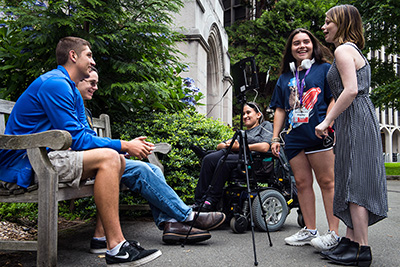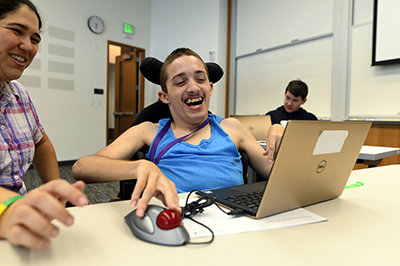Summer Study: What Do Phase II Scholars Do?
Phase II Scholars return to the UW Seattle campus for their second Summer Study. They meet the Phase I Scholars, learn about college life and career preparation, and participate in a one-week workshop with postsecondary instructors.
Disability Advocacy with Rooted in Rights

During Summer Study we were able to help with the Phase II workshop with Rooted in Rights (RiR), an organization that creates web content such as videos and blogs to challenge the stigma of disability. To prepare for the workshop, we learned the basics of video editing, which was much more fun than we expected. The Scholars in the RiR workshop had a lot of fun learning how to make exciting and educational YouTube videos.
For four days we helped the Scholars complete their amazing videos. With the direction of the talented RiR staff, we edited our videos using Adobe Rush and shot our videos with a tripod and iPad. The RiR staff were very helpful, accommodating, diligent, and committed to creating quality content that will change the perceptions of society about people with disabilities.
“I am really glad I had an Intern in my group helping me coordinate, film, and edit our Rooted in Rights video,” one Scholar in our group said. We are so glad we had the privilege of working with our great Phase II Scholars group learning and exploring the field of disability advocacy.
Robotics and Stress

We assisted with the Robotics workshop, where we helped Scholars work together to create robots that would help teenagers manage stress. In this workshop, we discussed reasons for stress and ways we combat it and calm ourselves every day. After compiling information, we drafted ideas for social robots that we could use in our daily lives.
We used an interactive interface that allowed Scholars to design faces that they assumed would reduce stress and help other teenagers work through stress. The most common trait in each robot was that they played calming music that promoted the user to feel less stressed. Scholars were also able to give vital feedback to graduate students about their robot and how to make it both more appealing and accessible for students with disabilities.
We appreciate Maru’s guidance and energetic attitude during our sessions. She was able to guide Scholars and encourage them through their problems successfully. We also thank Maya for all of her behind the scene work she did to make this workshop successful.